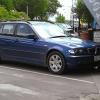-
Content Count
5627 -
Joined
-
Last visited
-
Days Won
119
Content Type
Profiles
Forums
Gallery
Calendar
Store
Everything posted by gjm
-
This morning - a month after shipping, the package was delivered. Bear in mind that it has taken a week to get any sort of response out of Aramex. Within 20 minutes of delivery I had received two emails, one advising me that my parcel had been delivered, and one advising my case is closed. Obviously no word, explanation or hint of why it took so long. S'pose we should just be grateful that they deigned to perform the service they were paid for, even if it was over 4 weeks later...
-
Callbacks... Try Aramex. It's fair to say that given the number of items they ship, some will get lost. I understand that, but would have hoped that given a certainty, they'd have a system for dealing with it. Days to get a reply by email. Phone calls are a complete waste of time. In the meantime, the customer you've sent something to (often) wants to know why they've not received their package; the saving grace with that is that an increasing number of folk know the service is sh!t so even sympathise when you're trying to get something sorted.
-

Is This Where The E30 Market Is Now..?
gjm replied to E30 325i Rag-Top's topic in TradeMe discussions
Just seen an absolutely mint, very early 320i facelift, 4 door manual offered for sale. €8500. Bit out of the way for easy collection, sadly. It's in Lithuania. -
Can't find that one now! (I know how to rebuild a 928 gearbox... )
-
This looks like one that was for sale less than 12 months ago. Was in decent condition, but by no means perfect.
- 14 replies
-
52" of trim strip.
-
Afterthought is wonderful! Not sure they'd have shipped well together - our order arrived in a 6' long, 4" diameter tube.
-
Ordered from them on Oct 18th. Arrived this morning - would have been sooner but for the 4-day weekend we had here.
-
Nothing wrong with a hub dyno. The only issue I can quickly think of is that it may give slightly different results to a rolling road (which may be less precise than a hub dyno). $190 doesn't sound expensive, even if you're only there for 30 minutes. You could be there for an hour. When I had my E30 dyno'd (in the UK) it cost £110, and that was over 10 years ago.
-

Is This Where The E30 Market Is Now..?
gjm replied to E30 325i Rag-Top's topic in TradeMe discussions
Much, much rarer than a M3. Shame it's just never really been used, but that's reflected in the condition. -
On a concrete floor in front of a bench. You even get to trample on some smug gits face while working.
-

Is This Where The E30 Market Is Now..?
gjm replied to E30 325i Rag-Top's topic in TradeMe discussions
A number of 'excitingly' priced listings. -

Is This Where The E30 Market Is Now..?
gjm replied to E30 325i Rag-Top's topic in TradeMe discussions
Does look nice. But for $38k asking I'd really expect to see more than a half-picture of the interior, and none of the engine bay or boot. -
Farmers are fed up with blanket water-related rates being applied by local councils when the majority of farms never touch town water systems. There are worrying rumours of council plans to charge folk who catch rainwater based on roof area. NIWA have had regs around bore holes and abstraction for ages so this could the next 'idea'.
-
Saw some of the Domain stuff on TV. Looked great.
-

Is This Where The E30 Market Is Now..?
gjm replied to E30 325i Rag-Top's topic in TradeMe discussions
E30 prices are officially nuts. (Note: In my opinion. ) $500 will buy: If the seller can get this, then good for them. I, and I've no doubt others, will be kicking themselves for the many skips full of similar parts that we've thrown away over the years!





